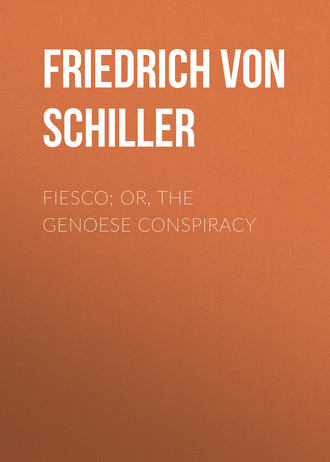 полная версия
полная версияFiesco; or, the Genoese Conspiracy
CONSPIRATORS. Bind him! throw him down!
FIESCO (snatching up his sword, and making way through them). Gently! Who will be the first to throw the cord around the tiger? See, Genoese, – I stand here at liberty, and might force my way with ease, had I the will – but I will stay – I have other thoughts —
BOURGOGNINO. Are they thoughts of duty?
FIESCO (haughtily). Ha! boy! learn first to know thy own – and towards me restrain that tongue! Be appeased, Genoese, – our plans remain unaltered. (To the MOOR, whose cords he cuts with a sword). Thou hast the merit of causing a noble act – fly!
CALCAGNO (enraged). What? Shall that scoundrel live, – he who has betrayed us all?
FIESCO. Live – though he has frightened you all. Rascal, begone! See that thou turn thy back quickly on Genoa; lest some one immolate thee to the manes of his courage.
MOOR. So, then, the devil does not forsake his friends. Your servant, gentlemen! I see that Italy does not produce my halter; I must seek it elsewhere.
[Exit, laughing.
SCENE XFIESCO, CONSPIRATORS. Enter SERVANT.
SERVANT. The Countess Imperiali has already asked three times for your grace.
FIESCO. Ha! then the comedy must indeed begin! Tell her I come directly. Desire my wife to hasten to the concert-room, and there remain concealed behind the tapestry. (Exit SERVANT.) In these papers your several stations are appointed: let each but act his part, the plan is perfect. Verrina will lead the forces to the harbor, and when the ships are seized will fire a shot as a signal for the general attack. I now leave you upon important business; when you hear the bell come all together to my concert-room. Meanwhile enjoy my Cyprian wine within. (They depart into the palace.)
SCENE XILEONORA, ARABELLA, and ROSA.
LEONORA. Fiesco promised to meet me here, and comes not. 'Tis past eleven. The sound of arms and men rings frightfully through the palace, and no Fiesco comes.
ROSA. You are to conceal yourself behind the tapestry – what can the count intend?
LEONORA. He directs and I obey. Why should I fear? And yet I tremble, Arabella, and my heart beats fearfully with apprehension. For heaven's sake, damsels, do not leave me.
ARABELLA. Fear nothing; our timidity subdues our curiosity.
LEONORA. Where'er I turn my eyes strange shapes appear with hollow and distracted countenances. Whomsoever I address trembles like a criminal, and withdraws into the thickest gloom of night, that fearful refuge of a guilty conscience. Whate'er they answer falls from the trembling tongue in doubtful accents. Oh, Fiesco! what horrid business dost thou meditate? Ye heavenly powers! watch over my Fiesco!
ROSA (alarmed). Oh, heavens! what noise is that without?
ARABELLA. It is the soldier who stands there as sentinel. (The SENTINEL without calls, "Who goes there?")
LEONORA. Some one approaches. Quick! behind the curtain. (They conceal themselves.)
SCENE XIIJULIA and FIESCO, in conversation.
JULIA (much agitated). Forbear, count! Your passion meets no longer an indifferent ear, but fires the raging blood – where am I? Naught but seducing night is here! Whither has your artful tongue lured my unguarded heart?
FIESCO. To this spot where timid love grows bold, and where emotions mingle unrestrained.
JULIA. Hold, Fiesco! For Heaven's sake no more! 'Tis the thick veil of night alone which covers the burning blushes on my cheeks, else wouldst thou pity me.
FIESCO. Rather, Julia, thy blushes would inflame my passions, and urge them to their utmost height. (Kisses her hand eagerly.)
JULIA. Thy countenance is glowing as thy words! Ah! and my own, too, burns with guilty fire. Hence, I entreat thee, hence – let us seek the light! The tempting darkness might lead astray the excited senses, and in the absence of the modest day might stir them to rebellion. Haste, I conjure thee, leave this solitude!
FIESCO (more pressing). Why so alarmed, my love? Shall the mistress fear her slave?
JULIA. O man, eternal paradox! then are you truly conquerors, when you bow as captives before our self-conceit. Shall I confess, Fiesco? It was my vice alone that could protect my virtue – my pride alone defied your artifices – thus far, my principles prevailed, and all your arts were foiled – but in despair of every other suit you made appeal to Julia's passion – and here my principles deserted me —
FIESCO (with levity). And what loss was that?
JULIA (with emotion). If I betray the safeguards of my honor, that thou mayest cover me with shame at will, what have I less to lose than all? Wouldst thou know more, scoffer? Shall I confess that the whole secret wisdom of our sex is but a sorry precaution for the defence of this weak fortress, which in the end is the sole object of assault by all your vows and protestations, and which (I blush to own it) is so willingly surrendered – so often betrayed to the enemy upon the first wavering of virtue? That woman's whole art is enlisted in fortifying a defenceless position, just as in chess the pieces move and form a breastwork round the defenceless king? – surprise the latter – check-mate! and the whole board is thrown into confusion. (After a pause – with earnestness), behold the picture of our boasting weakness. Be generous, Fiesco!
FIESCO. And yet, my Julia – where could'st thou bestow this treasure better than on my endless passion?
JULIA. Certainly, nowhere better, and nowhere worse? Tell me, Fiesco, how long will this endless passion endure? But, alas! I've risked too much already now to hesitate at staking my last. I trusted boldly to my charms to captivate thee – to preserve thy love, I fear they'll prove too weak. Fie upon me! – what am I uttering? (Hides her face with her hands.)
FIESCO. Two sins in one breath. Mistrust in my taste, and treason against the sovereignty of your charms? Which of the two is the most difficult to forgive?
JULIA (in a tremulous, imploring tone). Falsehood is the armory of hell! Fiesco needs not this to gain his Julia. (She sinks exhausted on a sofa: after a pause – energetically.) Hear, Fiesco! One word more. When we know our virtue to be in safety, we are heroines; in its defence, no more than children; (fixing her eyes on him wildly) – furies, when we avenge it. Hear me! Should'st thou strike me to the heart with coldness?
FIESCO (assuming an angry tone). Coldness? coldness? Heavens! What does the insatiable vanity of woman look for, if she even doubt the man who lies prostrate at her feet? Ha! my spirit is awakened; my eyes at length are opened. (With an air of coldness.) What was this mighty sacrifice? Man dearly purchases a woman's highest favors by the slightest degradation! (Bowing ceremoniously.) Take courage, madam! you are safe.
JULIA (with astonishment). Count! what sudden change is this?
FIESCO (with great indifference). True, madam! You judge most rightly; we both have risked our honor. (Bowing ceremoniously.) I will await the pleasure of your company among my guests. (Going.)
JULIA (stops him). Stay! art thou mad? Must I, then, declare a passion which the whole race of men, upon their knees, should not extort from my inflexible pride? Alas! in vain the darkness strives to hide the blushes which betray my guilt. Fiesco – I wound the pride of all my sex – my sex will all detest me – Fiesco – I adore thee – (falls at his feet).
FIESCO (steps back without raising her, laughing with exultation). That I am sorry for, signora – (rings the bell – draws the tapestry, and discovers LEONORA). Here is my wife – an angel of a woman! (Embracing her.)
JULIA (with a shriek). Unheard-of treachery!
SCENE XIIIThe CONSPIRATORS, entering in a body – LADIES on the other side – FIESCO, JULIA, and LEONORA.
LEONORA. Oh, my husband, that was too cruel!
FIESCO. A wicked heart deserved no less. I owed this satisfaction to your tears. (To the company.) No, – my friends – I am not wont on every slight occasion to kindle into passion. The follies of mankind amuse me long ere they excite my anger; but this woman merits my whole resentment. Behold the poison which she had mingled for my beloved Leonora. (Shows the poison to the company – they start with horror.)
JULIA (biting her lips with rage). Good! Good! Very good, Sir! (Going.)
FIESCO (leads her back by the arm). You must have patience, madam; something else remains. My friends, perhaps, would gladly learn why I debased my reason with the farce of love for Genoa's silliest coquette.
JULIA (starting up). It is not to be borne. But tremble! Doria rules in Genoa, and I am Doria's sister —
FIESCO. Poor, indeed, if that be your only sting! Know that Fiesco of Lavagna has changed the diadem of your illustrious brother for a halter, and means this night to hang the thief of the republic. (She is struck with terror – he continues with a sarcastic laugh.) Ha! that was unexpected. And do you see, madam, 'twas for this purpose that I tried to blind the eyes of the Dorias. For this I assumed a mock passion – (pointing to JULIA.) For this I cast away this precious jewel – (pointing to LEONORA); and by shining bait ensnared my prey. I thank you for your complaisance, signora – (to JULIA;) and resign the trappings of my assumed character. (Delivers her the miniature with a bow.)
LEONORA (to FIESCO, in a supplicating tone). She weeps, my Lodovico. May your Leonora, trembling, entreat you?
JULIA (enraged, to LEONORA). Silence, detested woman!
FIESCO (to a SERVANT). Be polite to my friend; escort this lady. She has a mind to see my prison-chamber – take care that none approach to incommode her. The night air is blowing somewhat keenly, the storm which rives the house of Doria may, perchance, ruffle the lady's head-dress.
JULIA. Curses on thee, black, detested hypocrite! (Enraged, to LEONORA.) Rejoice not at thy triumph! He will destroy thee also, and himself – and then despair! (Rushing out!)
FIESCO (to the guests). You were witnesses; let your report in Genoa preserve my honor. (To the CONSPIRATORS.) Call on me as soon as the cannon gives the signal. (All the guests retire.)
SCENE XIVLEONORA and FIESCO.
LEONORA (approaching with anxiety). Fiesco! Fiesco! I understand but half your meaning; yet I begin to tremble.
FIESCO (significantly). Leonora! I once saw you yield the place of honor to another. I saw you, in the presence of the nobles, receive the second compliment. Leonora, that sight tormented me. I resolved it should be so no longer. Henceforth it ceases. Do you hear the warlike noise which echoes through my palace? What you suspect is true. Retire to rest, countess, to-morrow you shall awake Duchess of Genoa.
LEONORA (clasping her hands together, and throwing herself into a chair). O God! My very fears! I am undone!
FIESCO (seriously, and with dignity). Let me speak out, my love. Two of my ancestors wore the triple crown. The blood of the Fiescos flows not pure unless beneath the purple. Shall your husband only reflect a borrowed splendor? (In a more energetic manner.) What! shall he owe his rank alone to capricious chance, which, from the ashes of mouldering greatness, has patched together a John Louis Fiesco? No, Leonora, I am too proud to accept from others what my own powers may achieve. This night the hereditary titles of my ancestors shall return to deck their tombs – Lavagna's counts exist no longer – a race of princes shall begin.
LEONORA (mournfully, and giving way to imagination). I see my husband fall, transfixed by deadly wounds. (In a hollow voice.) I see them bear my husband's mangled corpse towards me. (Starting up.) The first – the only ball has pierced Fiesco's heart.
FIESCO (tenderly seizing her hand). Be calm, my love. The only ball will not strike me.
LEONORA (looking steadfastly at him). Does Fiesco so confidently challenge Heaven? If, in the scope of countless possibilities, one chance alone were adverse, that one might happen, and I should lose my husband. Think that thou venturest Heaven, Fiesco; and though a million chances were in thy favor, wouldst thou dare tempt the Almighty by risking on a cast thy hopes of everlasting happiness? No, my husband! When thy whole being is at stake each throw is blasphemy.
FIESCO. Be not alarmed. Fortune and I are better friends.
LEONORA. Ah! say you so, Fiesco? You, who have watched the soul-convulsing game, which some call pastime? Have you not seen the sly deceiver, Fortune, how she leads on her votary with gradual favors, till, heated with success, he rushes headlong and stakes his all upon a single cast? Then in the decisive moment she forsakes him, a victim of his rashness – and stood you then unmoved? Oh, my husband, think not that thou hast but to show thyself among the people to be adored. 'Tis no slight task to rouse republicans from their slumber and turn them loose, like the unbridled steed, just conscious of his hoofs. Trust not those traitors. They among them who are most discerning, even while they instigate thy valor, fear it; the vulgar worship thou with senseless and unprofitable adoration. Whichever way I look Fiesco is undone.
FIESCO (pacing the room in great emotion). To be irresolute is the most certain danger. He that aspires to greatness must be daring.
LEONORA. Greatness, Fiesco! Alas! thy towering spirit ill accords with the fond wishes of my heart. Should fortune favor thy attempt – shouldst thou obtain dominion – alas! I then shall be but the more wretched. Condemned to misery shouldst thou fail – if thou succeed, to misery still greater. Here is no choice but evil. Unless he gain the ducal power, Fiesco perishes – if I embrace the duke I lose my husband.
FIESCO. I understand you not.
LEONORA. Ah! my Fiesco, in the stormy atmosphere that surrounds a throne the tender plant of love must perish. The heart of man, e'en were that heart Fiesco's, is not vast enough for two all-powerful idols – idols so hostile to each other. Love has tears, and can sympathize with tears. Ambition has eyes of stone, from which no drop of tenderness can e'er distil. Love has but one favored object, and is indifferent to all the world beside. Ambition, with insatiable hunger, rages amid the spoil of nature, and changes the immense world into one dark and horrid prison-house. Love paints in every desert an elysium. And when thou wouldest recline upon my bosom, the cares of empires, or rebellious vassals, would fright away repose. If I should throw myself into thy arms, thy despot fears would hear a murderer rushing forth to strike thee, and urge thy trembling flight through all the palace. Nay, black suspicion would at last o'erwhelm domestic concord. If thy Leonora's tenderness should offer thee a refreshing draught, thou wouldst with horror push away the goblet, and call it poison —
FIESCO (starting). Leonora, cease! These thoughts are dreadful.
LEONORA. And yet the picture is not finished. Let love be sacrificed to greatness – and even peace of mind – if Fiesco but remained unchanged. O God! that thought is racking torture. Seldom do angels ascend the throne – still seldomer do they descend it such. Can he know pity who is raised above the common fears of man? Will he speak the accents of compassion who at every wish can launch a bolt of thunder to enforce it. (She stops, then timidly advances, and takes his hand with a look of tender reproach.) Princes, Fiesco – these abortions of ambition and weakness – who presume to sit in judgment 'twixt the godhead and mortality. Wicked servants – worse rulers.
FIESCO (walking about much agitated). Leonora, cease! The bridge is raised behind me —
LEONORA (with a look of tenderness). And why, my husband? Deeds alone are irrevocable. Thou once didst swear (fondly clinging to him, and somewhat archly) that all thy projects vanished before my beauty. Thou hast foresworn thyself, dissembler – or else my charms have prematurely withered. Ask thy own heart where lies the blame? (More ardently, and throwing her arms round him.) Return, Fiesco! Conquer thyself! Renounce! Love shall indemnify thee. O Fiesco, if my heart cannot appease thy insatiate passions, the diadem will be found still poorer. Come, I'll study the inmost wishes of this soul. I will melt into one kiss of love all the charms of nature, to retain forever in these heavenly bonds the illustrious captive. As thy heart is infinite, so shall be my passion. To be a source of happiness to a being who places all its heaven in thee, Fiesco? Ought that to leave any void in thy heart.
FIESCO (with great emotion). Leonora – what hast thou done? (He falls, overcome, on her neck.) I shall never more dare to meet the eyes of Genoa's citizens.
LEONORA (with lively expression). Let us fly, Fiesco! let us with scorn reject these gaudy nothings, and pass our future days only in the retreats of love! (She presses him to her breast with rapture.) Our souls, serene as the unclouded sky, shall never more be blackened by the poisonous breath of sorrow; our lives shall flow harmoniously as the music of the murmuring brook. (A cannon-shot is heard – FIESCO disengages himself – all the conspirators enter.)
SCENE XVCONSPIRATORS. The hour is come!
FIESCO (to LEONORA, firmly). Farewell! forever unless Genoa to-morrow be laid prostrate at thy feet. (Going to rush out.)
BOURGOGNINO (cries out). The countess faints! (LEONORA in a swoon – all run to support her.)
FIESCO (kneeling before her, in a tone of despair). Leonora! Save her! For heaven's sake save her! (ROSA and ARABELLA run to her assistance.) She lives – she opens her eyes (jumps up resolutely). Now to close Doria's! (Conspirators rush out.)
ACT V
SCENE IAfter midnight. The great street of Genoa. A few lamps, which gradually become extinguished. In the background is seen the Gate of St. Thomas, which is shut. Men pass over the stage with lanterns. The patrol go their round. Afterwards, everything is quiet except the waves of the sea, which are heard at a distance, rather tempestuous.
FIESCO (armed, before the Doria Palace), and ANDREAS.
FIESCO. The old man has kept his word. The lights are all extinguished in the palace – the guards dismissed – I'll ring. (Rings at the gate.) Ho! Halloo! Awake, Doria! Thou art betrayed. Awake! Halloo! Halloo!
ANDREAS (appearing at the balcony). Who rings there?
FIESCO (in a feigned voice). Ask not, but follow me! Duke, thy star has set; Genoa is in arms against thee! Thy executioners are near, and canst thou sleep, Andreas?
ANDREAS (with dignity). I remember when the raging sea contended with my gallant vessel – when her keel cracked and the wind split her topmast. Yet Andreas Doria then slept soundly. Who sends these executioners!
FIESCO. A man more terrible than your raging sea – John Louis Fiesco.
ANDREAS (laughs). You jest, my friend. Come in the daytime to play your tricks. Midnight suits them badly.
FIESCO. Dost thou then despise thy monitor?
ANDREAS. I thank him and retire to rest. Fiesco, wearied with his rioting, sleeps, and has no time to think of Doria.
FIESCO. Wretched old man! Trust not the artful serpent! Its back is decked with beauteous colors; but when you would approach to view it you are suddenly entwined within its deadly folds. You despised the perfidious Moor. Do not despise the counsels of a friend. A horse stands ready saddled for you; fly, while you have time!
ANDREAS. Fiesco has a noble mind. I never injured him, and he will not betray me.
FIESCO. Fiesco has a noble mind and yet betrays thee. He gives thee proof of both.
ANDREAS. There is a guard, which would defy Fiesco's power, unless he led against them legions of spirits.
FIESCO (scornfully). That guard I should be glad to see to despatch it with a message for eternity.
ANDREAS (in an elevated manner). Vain scoffer! Knowest thou not that Andreas has seen his eightieth year, and that Genoa beneath his rule is happy? (Leaves the balcony.)
FIESCO (looks after him with astonishment). Must I then destroy this man before I have learnt how difficult it is to equal him? (He walks up and down some time in meditation). 'Tis past, Andreas. I have repaid the debt of greatness. Destruction take thy course! (He hastens into a remote street. Drums are heard on all sides. A hot engagement at the St. Thomas' Gate. The gate is forced, and opens a prospect in the harbor, in which lie several ships with lights on board.)
SCENE IIGIANETTINO (in a scarlet mantle). LOMELLINO – (Servants going before them with torches).
GIANETTINO (stops). Who was it that commanded the alarm to be beat?
LOMELLINO. A cannon was fired on board one of the galleys.
GIANETTINO. The slaves perhaps have risen in mutiny. (Firing heard at the gate of St. Thomas.)
LOMELLINO. Hark! A shot!
GIANETTINO. The gate is open. The guards are in confusion. (To the servants.) Quick, rascals! Light us to the harbor. (Proceeding hastily towards the gate.)
SCENE IIIThe former; BOURGOGNINO, with some CONSPIRATORS, coming from the gate of St. Thomas.
BOURGOGNINO. Sebastian Lascaro was a brave soldier.
ZENTURIONE. He defended himself like a bear till he fell.
GIANETTINO (steps back startled). What do I hear? (to his servants). Stop!
BOURGOGNINO. Who goes there with torches?
LOMELLINO (to GIANETTINO). Prince, they are enemies. Turn to the left.
BOURGOGNINO (calls to then peremptorily). Who goes there with the torches?
ZENTURIONE. Stand! Your watchword?
GIANETTINO (draws his sword fiercely). Loyalty and Doria!
BOURGOGNINO (foaming with rage). Violator of the republic and of my bride! (To the CONSPIRATORS, rushing upon GIANETTINO.) Brothers, this shortens our labor. His devils themselves deliver him into our hands – (runs him through with his sword).
GIANETTINO (falling). Murder! Murder! Murder! Revenge me, Lomellino —
LOMELLINO and SERVANTS (flying). Help! Murder! Murder!
ZENTURIONE (halloing with vehemence). Doria is down. Stop the Count Lomellino! (LOMELLINO is taken).
LOMELLINO (kneeling). Spare but my life, I'll join your party.
BOURGOGNINO (looking at GIANETTINO). Is this monster yet alive? Let the coward fly. (LOMELLINO escapes.)
ZENTURIONE. St. Thomas' gate our own! Gianettino slain! Haste some of you and tell Fiesco.
GIANETTINO (heaving himself from the ground in agony). Fiesco! Damnation! (Dies.)
BOURGOGNINO (pulling the sword out of GIANETTINO'S body). Freedom to Genoa, and to my Bertha. Your sword, Zenturione. Take to my bride this bloody weapon – her dungeon is thrown open. I'll follow thee, and bring the bridal kiss. (They separate through different streets.)
SCENE IVANDREAS DORIA, GERMANS.
GERMAN. The storm drove that way. Mount your horse, duke!
ANDREAS. Let me cast a parting look at Genoa's towers! No; it is not a dream. Andreas is betrayed.
GERMAN. The enemy is all around us. Away! Fly! Beyond the boundaries!
ANDREAS (throwing himself upon the dead body of his nephew). Here will I die. Let no one talk of flight. Here lies the prop of my old age – my career is ended. (CALCAGNO appears at a distance, with CONSPIRATORS.)
GERMAN. Danger is near. Fly, prince! (Drums beat.)
ANDREAS. Hark, Germans, hark! These are the Genoese whose chains I broke. (Hiding his face.) Do your countrymen thus recompense their benefactors?
GERMAN. Away! Away! while we stay here, and notch their swords upon our German bones. (CALCAGNO comes nearer.)
ANDREAS. Save yourselves! Leave me! and go, declare the horrid story to the shuddering nations that Genoa slew its father —
GERMAN. Slew! 'Sdeath, that shall not be. Comrades, stand firm! Surround the duke! (They draw their swords.) Teach these Italian dogs to reverence his gray head —
CALCAGNO (calls out). Who goes there? What have we here?
GERMAN. German blows – (retreat fighting, and carry off the body of GIANETTINO.)
SCENE VLEONORA, in male attire, ARABELLA following – they walk along timidly.
ARABELLA. Come, my lady, pray let us hasten onward.
LEONORA. This way the tumult rages – hark! was not that a dying groan? Ah, they surround him! At Fiesco's breast they point their fatal muskets – at my breast they point them. Hold! hold! It is my husband! (Throws her arms up in agony.)
ARABELLA. For heaven's sake, my lady!
LEONORA (with wild enthusiasm, calling on all sides). O my Fiesco! my Fiesco! His firmest friends desert him. The faith of rebels is unsteady (shuddering). Rebels! Heaven? Is Fiesco, then, a chief of rebels?









